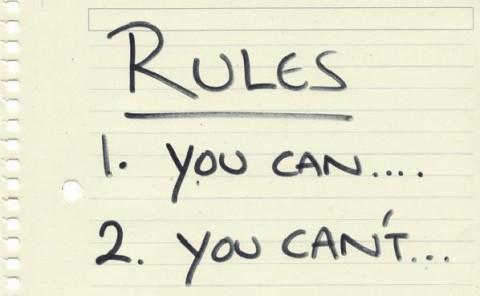Rules to Have for Your Children

It is important that you have rules for your children. Disciplining a child and raising them to be well behaved comes from having boundaries and consequences for breaking those boundaries. It is important to have established rules and not just introduce a rule when you feel like it. A child should be making a conscious decision to disobey a rule because they have been instructed on the rule.
There are times when a child encounters a decision that has not been discussed by the parent. If a wrong decision is made, you should make your best effort to determine what the child's heart was in making that decision and if it requires correction or instruction.
In our family, there were two consequences for misbehavior: correction and instruction. All correction came with instruction, but instruction did not come with correction. Correction meant punishment (usually a spanking), while instruction meant a talk with the child about what they did, why the did it, why it was wrong, how to act in the future, and other things like that, and always included prayer.
Here are a list of rules in our house that we had when the children were growing up. We actually had a version of this we put on our refrigerator, so they were always reminded. I will give some rules we had, separated by correction required or instruction only.
Correction Required:
1. Defiance: This is when mommy or daddy tells them to do something or not to do something and they do the opposite. For example, if you tell your child to pick up their toy and they say no then they are being defiant. Also, if you tell your child to stop playing soccer in the house and they continue, they are being defiant. We expected immediate obedience from our children, though we tended to give them a single warning.
2. Disobedience: This is similar to defiance. This is when you tell your child they are not allowed to do something or they are required to do something, but is more long term. This could mean you telling your child they can't go to their friends house over the weekend, yet they do it anyway. This could also be you making a rule saying no candy before dinner, so every time that rule is broken, they are being disobedient.
3. Being mean to siblings: This was any act we deemed bullying of their siblings. Physical hitting of their sibling required correction always. Saying something mean was another thing, whether it be a mean joke or just them yelling at their sibling. If siblings were having an argument, we would make a judgment and if one or both disobeyed the judgment, they were corrected (for example, if they argue over who gets a toy, you can say take turns and if one doesn't, that is correctable).
4. Using bad language: There are certain words you teach your children not to say. If they say the word, they are corrected. Even as our children got older, when most parents tend to tolerate bad language, we demanded they be respectful.
5. Lying: Lying always meant a spanking in our home. We simply did not tolerate it. Lying destroys trust and destroys relationships, on top of it being sinful (one of the ten commandments in fact).
6. Breaking a rule at school: If a child broke a rule at school that would normally earn correction at home, they are corrected at home (even if they receive a punishment at school). If they are talking during class and got a detention, we often did not correct them unless it was a pattern. But if they cheated on a test, we considered that lying, or if they were being mean to another student, we considered that like being mean to a sibling.
Instruction Required:
1. Bad attitude: This is if they are not being completely respectful because they are upset, or are being very negative. They have not yet crossed the line to earn correction, so preemptive instruction is best.
2. Bad grades at school: We would have a talk if our children got a bad grade on a test, to determine if it was due to lack of effort or lack of understanding.
3. Unique situations: This is hard to determine, but certain times your child makes a choice you do not approve of, but they didn't know you didn't approve. For example, the first time our daughter toilet papered a friends house, we had a talk and told her that she should be respectful and not take part in those activities.
That is an example of some of the rules we had. The page on discipline goes in depth into correction.

